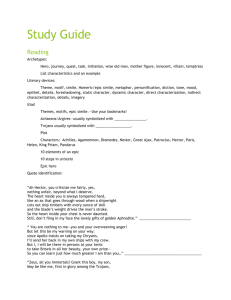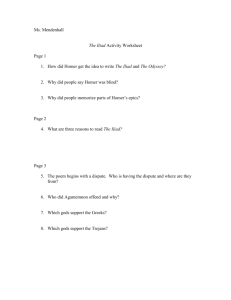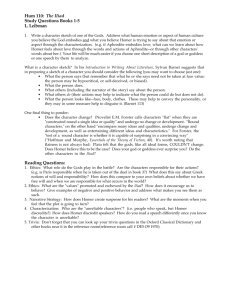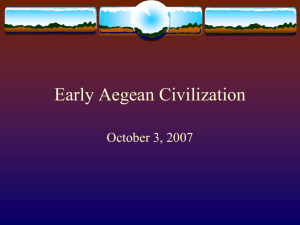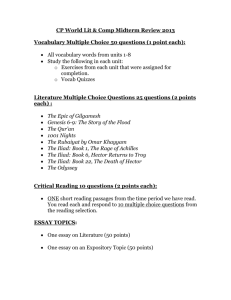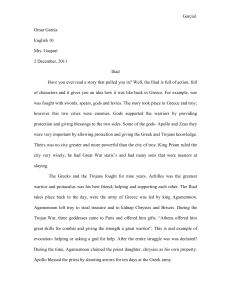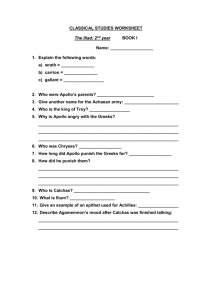Iliad
advertisement
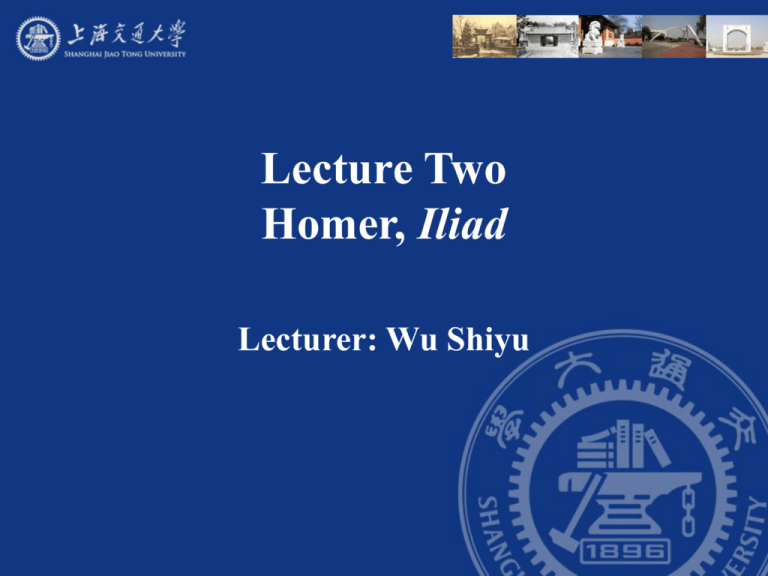
Lecture Two Homer, Iliad Lecturer: Wu Shiyu Outline I. Some courses view the Iliad as a work of history. It has a strong kernel of historical accuracy and discusses the great events that led to the sacking of Troy. This course asks what in the Iliad speaks to us today and how it is relevant to modern people. II. The fundamental themes of the Iliad are gods, fate, and the meaning of life. For Homer, fate and the gods were means by which a person could learn more about the meaning of life. III. The Iliad consists of 15,693 lines, composed around 800 B.C. by a single creative genius, Homer. A. Homer composed the work in Asia Minor, in what is now Turkey. B. Iliad means “tale of Ilium,” or Troy. C. For the Greeks, the Iliad had the same role that the Bible once had in American life; it was a guide for moral instruction. D. In addition, it was a book written in sublime poetry. Some Greeks even knew it by heart. E. This narrative poem describes a few days in the struggle between the Greeks and the Trojans that lasted more than 10 years. 1. Before the events of the Iliad take place, the story began with a dispute among the gods. The goddess of discord brought to a banquet a golden apple to be given to the fairest goddess. The gods requested that Zeus decide which one was the fairest, and he delegated the decision to Paris. Aphrodite, Hera, and Athena offered bribes to Paris, and Paris chose Aphrodite, who offered him the most beautiful woman in the world. Paris thereby incurred the wrath of Hera and Athena. Helen, the wife of Menelaus, eloped with Paris. 2. Agamemnon, the brother of Menelaus, led the fleet that was to sail to Troy to retrieve Helen. However, the ships could not leave because there was no wind. A soothsayer indicated that the gods were outraged and would not be satisfied unless Iphigenia, the daughter of Agamemnon, was sacrificed. The winds came up, and the fleet sailed to Troy. The struggle lasted 10 years, during which the Trojans were too bound by honor to give Helen back and the Greeks were too bound by honor to return home. 3. What began as an expedition to retrieve honor became a 10-year war in the Middle East. 4. Homer’s poetic genius was such that he chose one episode in the war to crystallize all the great themes. 5. The story of the Iliad begins with the outrage of Achilles about the wrong done him by Agamemnon. Achilles believed that he had been dishonored and refused to fight; after his withdrawal, the Trojans came near to victory. To save the honor of Greece, Patroclus, a friend of Achilles, put on the armor of Achilles and died at the hand of Hector, the noblest of the Trojans. Achilles, motivated by the death of his friend and driven by honor and anger, then went into battle and killed Hector. He finally returned Hector’s body at the request of Priam, Hector’s father, and the story itself ends with the funeral of Hector. IV. Central questions of the Iliad include the following: A. Why are we here? B. Why is war waged? C. Why do innocents suffer? V. The Iliad is considered the first great work of literature. It was the work most revered by the ancient Greeks. VI. One theme of the Iliad is the role of the gods. A. Homer states, “Thus was the will of Zeus fulfilled.” B. Who were the gods of Homer? 1. Homer was a polytheist, believing in many gods. 2. For Homer, these gods were real, not silly creations of mythology. These real gods embodied powerful forces. 3. Polytheists define a divinity as a being capable of rendering supernatural benefits to the community. These powers could do good or harm. 4. Mythology is a means of expressing a higher truth. 5. The god Zeus, the king of gods and men, represents a seed of development that leads to an idea of one all-powerful and all-controlling god. VII. Zeus can control fate, but men and women can make conscious decisions about good and evil. A. It was the will of Zeus that the Greeks and Trojans should suffer and that Troy be destroyed. B. Fate is what the gods decree for us in their power and knowledge. C. People make conscious decisions about good and evil, and these decisions give meaning to their lives. 1. Agamemnon’s wife murdered Agamemnon because he had acquiesced in the sacrifice of their daughter. 2. Hybris, defined as outrageous arrogance by which power is used to inflict pain upon the innocent, is a moral wrong. 3. Acquiescing in this sacrifice represented an act of hybris. 4. Agamemnon believed his duty was to conquer Troy and return home in glory. The gods had made him morally blind. His absence of moral vision led him to commit hybris. 5. The gods do not forget such outrages. His judgment would come. Agamemnon might come home, but he would die. VIII. One lesson of Homer is that the gods care about good and evil. A. Absolute right and absolute wrong exist. B. The gods ultimately punish what is wrong and reward what is right. C. Mortals lack vision to understand what is good and what is evil until it is too late. D. Homer believed that people do not understand the ways of the gods. The Iliad was a means of beginning to gain wisdom. 1. Homer and the Bible agree that fear of god is the beginning of wisdom. 2. The omens of the gods should be taken seriously, because they are the means by which the gods make their will known. IX. The Iliad is ultimately a book about the meaning of life and how to lead that life. A. It is a story of the education of Achilles. The mother of Achilles, who was divine, had given him a choice: He could either live a long life or live a life of glory and die young. He elected a life of glory and honor, which gave meaning to his life. He had a reputation for telling the truth, keeping his word, seeking vengeance for those who wronged him, and defending himself and the weak. B. The importance of moderation in pursuing one’s values is an important lesson. 1. Achilles attained wisdom when Priam came to claim his son; Achilles realized that the concept of honor could be pushed too far. 2. Each person has an ideal that he or she prizes and will do anything to hold onto that concept. C. We increase our wisdom only by suffering. 1. Achilles learned by suffering, that is, by the loss of what was dearest to him. 2. Zeus willed that we learn and gain wisdom only through suffering. 3. All generations must read the same books, repeat the same errors, and fight the same wars. X. True wisdom knows when to push a thing so far that other ordinary mortals will think it excessive. A truly wise person also must know how far is too far. Achilles gives us this lesson: All mortals must die, but how people live their lives is what matters. 谢 谢!

